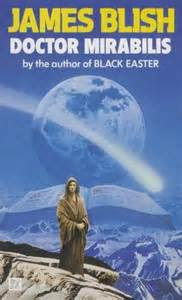See Heraclitus here and James Blish's After Such Knowledge here.
Beginning to reread ASK Vol I, Doctor Mirabilis, I find a somewhat obscure but also profound reference to Heraclitus:
"Though Heraclitus had never been able to put his foot twice into the same river, he had never been in any doubt about which was the river and which was the foot (one was cold, one got cold; but how in memory could he trust the order of these events, one being - secondary - used to judge the primary other?); everything changed, but only to remain more and more perfectly the same, like the River Meander which cut new banks and channels every year to maintain that clear, fixed, Platonic word of which the river in flux could never be more than a shadow."
-James Blish, After Such Knowledge (London, 1991), pp. 48-49)
(Should "...Platonic word..." read "...Platonic world..."? I will consult another edition.)
Again:
"...the Heraclitean river - not the Yeo, but a much more drastic Meander - flowed in an underground torrent beneath Yeo Manse too, as under all things else.
"As that river flowed on inexorably, the morning grew older..." (p. 49)
The Heraclitean river is time and it is Roger Bacon that contemplates it. Bacon, studying Aristotle and peering through glass into a cat's eye (p. 25), is a precursor of science, thus of science fiction, thus of sf characters like Anderson's psychotechnicians and Fr Axor, Blish's Jovian Bridge gang and Fr Ruiz Sanchez. John Amalfi in Blish's Cities In Flight refers to Bacon as the inventor of scientific method. Thus, Doctor Mirabilis is a prequel to all science fiction.
To continue this thread, see here.

1 comment:
Kaor , Paul!
James Blish is yet another SF writer whose works I need to reread! I have the three ASK books and his flying cities books, for example.
And your comments about Blish and the origins of science also reminded me of Poul Anderson's interest in such questions. He too was aware of the Classical and Christian origins of science, as seen in such works of his as IS THERE LIFE ON OTHER WORLDS, THE INFINITE VOYAGE, "Delenda est," etc.
Post a Comment